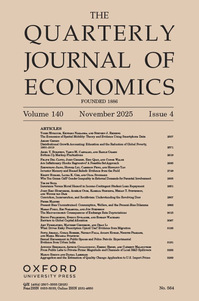A paper co-authored by Professor Panle Jia Barwick from the University of Wisconsin-Madison, Professor Siyu Chen from Jinan University, Professor Chao Fu from the University of Wisconsin-Madison, and Professor Teng Li from Sun Yat-sen University, titled “Digital Distractions with Peer Influence: The Impact of Mobile App Usage on Academic and Labor Market Outcomes,” has been published online in Quarterly Journal of Economics.
The Quarterly Journal of Economics (QJE), founded in 1886, is the oldest professional journal of economics in the English language. Edited at Harvard University’s Department of Economics, it covers all aspects of the field. With an impact factor of 12.7 in 2024, QJE is widely considered one of the top five economics journals. It is invaluable to professional and academic economists and students around the world.

Abstract
Concerns about excessive mobile phone use among youth are mounting. We present estimates of both behavioral and contextual peer effects, along with comprehensive evidence on how students’ own and their peers’ app usage affect academic performance, physical health, and labor market outcomes. Our analysis draws on administrative data from a Chinese university covering three student cohorts over four years. We exploit random roommate assignments, differential exposure to a policy shock (gaming restrictions for minors), and differential exposure to a discrete event (the introduction of a blockbuster video game) for identification. App usage is contagious: a one s.d. increase in roommates’ in-college app usage raises own usage by 5.8%. High app usage is harmful across all measured outcomes. A one s.d. increase in app usage reduces GPAs by 36.2% of a within-cohort-major s.d. and lowers wages by 2.3%. Roommates’ app usage reduces a student’s GPAs and wages through both disruptions and behavioral spillovers, generating a total negative effect that exceeds half the magnitude of the impact from the student’s own app usage. Extending China’s three-hour-per-week gaming restriction for minors to college students would boost their initial wages by 0.9%. High-frequency GPS and app usage data show that heavy app users spend less time in study halls, are more frequently late or absent from class, and get less sleep.
Author Profiles
Siyu Chen is a Tenured Associate Professor, Doctoral Advisor, and Assistant Dean at the Institute of Economics and Social Research (IESR), Jinan University. Her research interests span Labor Economics, Environmental Economics, and Applied Microeconomics. Her publications appear in top international journals, including the Quarterly Journal of Economics, Review of Economics and Statistics, Nature Mental Health, and Journal of Environmental Economics and Management. In addition, she has published in leading Chinese journals such as Management World and The World Economy. She has been Principal Investigator for multiple NSFC grants (General and Youth Programs) and has received several honors, including a First Prize in the 6th Guangdong Provincial Teaching Competition for Young Faculty.

Article Link: https://doi.org/10.1093/qje/qjaf048


